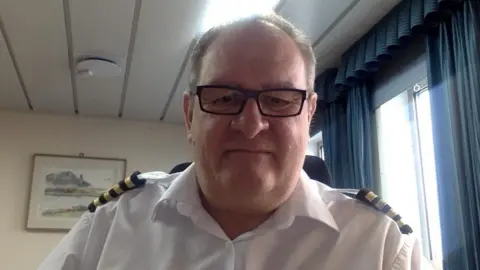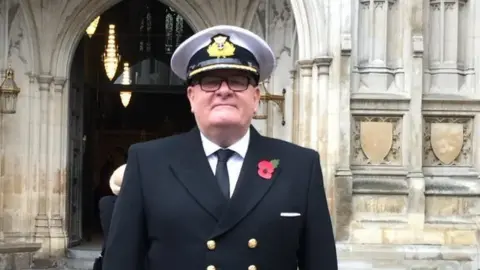'Corrupt ship inspectors demand our food and cargo'
 BBC
BBCSeafarers have told the BBC port officials routinely demand cash, cigarettes, food and drink as bribes before allowing ships through.
So-called "gratuities" are against international anti-corruption laws. But the Maritime Anti-Corruption Network said it received 5,183 reports in 2023.
The International Association of Ports and Harbours is working to tackle it.
Ex-captain Stephen Gudgeon said he was once held at gunpoint after refusing to hand over cigarettes at a port in Asia.
"They took me ashore at gunpoint and I was locked up. I was photographed and fingerprinted, and I was interviewed by two officials in an empty room with just a chair, which I was locked into," he told the BBC.
"And it was when they said to me, 'Would you like us to inform your family of your detention?' that I really got quite worried."
Mr Gudgeon said eventually he was released with a $1,500 (£1,200) fine to pay for paperwork irregularities, which he believed were spurious and in retaliation for not handing over the cigarettes. The BBC has been unable to reach the ports authority in question to ask about the allegations.
The MACN told the BBC it had received 61,000 reports in more than 1,000 ports across 150 countries since it opened an anonymous helpline in 2011.
Cecilia Muller Torbrand, the head of the MACN, said experiences as intimidating as Mr Gudgeon's were uncommon but that the shipping industry was "quite exposed to corruption risks", and that the number of incidents reported would be "the tip of the iceberg".
She said this was due to "the combination of frequent government interaction, shipping across multiple jurisdictions and the time element of sailing in and out of ports".
Difficult decision
Mr Gudgeon added that some crew are too afraid to report incidents because they are on contracts and fear they will be blacklisted and unable to get another job.
The former captain, who sailed for more than 40 years before retiring in 2022 and who is on the council of the Nautilus International union and volunteers for the International Seafarers Welfare and Assistance Network, said crews met with bribery demands faced a difficult decision.
"If the company found out you'd done it, you could be in real trouble. They could discipline you for forgiving gratuities when they quite clearly state that you shouldn't be doing it. But if you want the ship to be able to enter and leave port smoothly, then often these things happen."
He said he had witnessed officials whose demands for gratuities had been refused helping themselves to the ship's food provisions.

Filipino officer John Soria told the BBC that when the container ship he was sailing on came into port in Eastern Europe in 2018, inspectors came on board and tried to take a large 5kg block of cheese that was to last the crew of 17 half a month.
"He asked me, 'Is it possible to take this home?' I couldn't say no because he was already putting the cheese in the bag."
Mr Soria said he called over the cook who negotiated to cut the cheese in half. "Half is for the vessel, half for him - so we settled with that."
Prof Helen Sampson, director of the Seafarers International Research Centre at Cardiff University, said: "Sometimes when [crews have] had their provisions raided, they will sail and there won't be enough food left on board for everybody before the next port where they have a chance to resupply."
Guy Platten is the secretary general of the International Chamber of Shipping, which is made up of national ship-owning associations, collectively representing 80% of the world's merchant fleet.
He said he was aware that bribery demands were "very distressing for seafarers".
"What we would encourage them to do is contact their company if they're getting these demands, and then the company can take it from there and can explain that there is not going to be any payment," he said.
"We try and make sure that we act as one and progress is being made, but obviously it still happens."
Taking action
The MACN told the BBC it was working with governments in nine countries to tackle corrupt officials, but conceded there was still much to do.
Ms Muller Torbrand said the only way it could be stopped was if a majority of companies took a zero-tolerance approach.
"[Captains] should not [say], 'You need to do whatever it takes to get the vessel out.' No, we challenge these practices as an industry."
She said the MACN was working to help companies understand the risks, have better articulated policies and better internal escalation channels.
The International Association of Ports and Harbours said it was working in partnership with the MACN.
In a statement, it said: "Ports and their communities are endeavouring to work with their key stakeholders.
"Tangible progress has been made in places such as the Gulf of Suez, the Indian subcontinent and in African countries such as Nigeria, as well as in South America such as Argentina.
"This work alone is not enough as corruption in and around ports concerns many stakeholders. Port authorities can be involved, but so can customs authorities, shipping agents, freight forwarders, ship suppliers, pilots, surveyors and in fact any member of a particular port community.
"It is only through a deep-rooted approach at combatting corruption across entire port communities and at the interface between ship and shore that an impact can be made in the long term."
You can hear more about corruption at ports in Business Daily on the BBC World Service.
And find out more about why some seafarers are going hungry in The Food Chain podcast.
